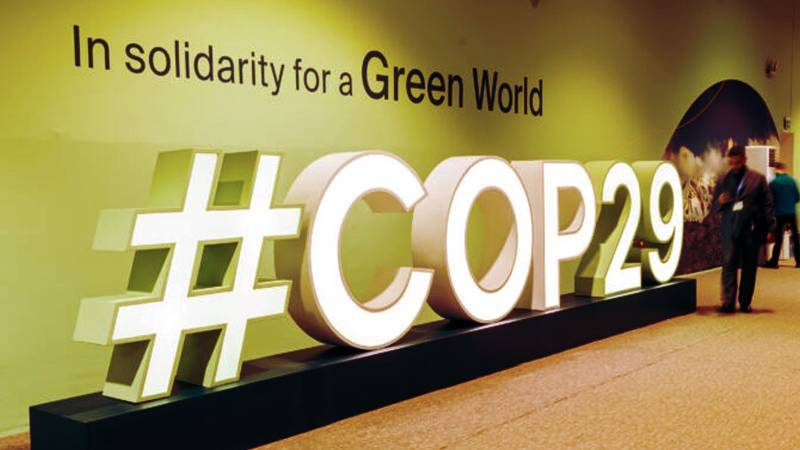
A cruel irony of our time is that wealth, while unable to buy happiness or peace of mind, is essential for survival and progress. Similarly, the global climate crisis has persisted for decades, despite numerous efforts to arrange financing to resolve them. While political will is undoubtedly crucial to addressing this challenge, the question remains: is it enough? Can mere intentions translate into tangible actions? Or must we also consider the urgency and potential consequences of inaction? For 29 years since the first climate summit (COP), nations have struggled to mobilise the necessary political will to combat climate change. As history has shown, funding often follows political will. However, the true test lies in whether this will can be harnessed to forge effective agreements and implement meaningful solutions.
The recent COP29 in Baku, Azerbaijan, saw a large Pakistani delegation, many of whom were non-technical officials. While their presence may have been well-intentioned, it did little to demonstrate substantial negotiating skills or effectively advocate for Pakistan’s interests on the global stage. This trend of large, often non-technical delegations is common among many developing nations, including Pakistan.
Despite the anticipation of a significant increase in climate finance from $100 billion to $1.3 trillion, the final outcome fell short of expectations, settling at a disappointing $300 billion, which includes both grants and loans. A more strategic approach, perhaps involving smaller but more technically skilled delegations, could have yielded better results for Pakistan and other developing nations.
A world quite clear of the gravity of the climate crisis is desperate for action. The urgency is palpable. But without the financial muscle to back it up, our noble intentions risk becoming mere footnotes in history. Meanwhile, a nation teetering on the brink, battered by the rattling impacts of climate change and burdened by heavy debt, Pakistan stands united with the G77 for raising a collective voice of the developing world. This beleaguered nation, one of the most vulnerable to climate catastrophe, demands its rightful share of climate finance.
Climate justice demands that those least responsible for the climate crisis should not bear its heaviest burden. Yet, Pakistan, a minor contributor to global greenhouse gas emissions, is disproportionately affected by climate change. As the world grapples with the consequences of unchecked carbon emissions, Pakistan's vulnerable communities, particularly from our coastal areas, deserts, and the low-lying Indus River basin, are facing the devastating impacts of climate change. While international efforts to address climate justice are underway, the question remains: how can Pakistan effectively advocate for climate justice at the national level and mobilise its citizens to demand accountability from the major carbon-emitting nations?
Pakistan, a nation grappling with its own myriads of challenges, has boldly pledged to reduce its greenhouse gas emissions by a staggering 50% by 2030 in its Nationally Determined Contributions (NDCs). This ambitious target, while commendable, is a stark contrast to the reluctance of major global emitters, who, despite their significant contributions to climate change, continue to hesitate in making concrete commitments.
The nation's systemic issues, including a disregard for merit and bureaucratic inefficiency, further hinder effective climate action
As a developing nation, Pakistan's carbon footprint is minimal. Yet, it has proactively taken the lead, demonstrating a commitment to climate action that far exceeds its historical responsibility. This proactive stance stands in sharp contrast to the strategic ambiguity of certain nations that have managed to position themselves as both developing and developed, allowing them to avoid stringent climate targets.
While Pakistan's climate vulnerability is undeniable, and the need for adaptation and resilience is paramount, the nation has embraced both mitigation and adaptation with equal fervor. This dual approach reflects a deep understanding of the complex and interconnected nature of the climate crisis. Despite having no effective and permanent mechanism to combat climate change, its make-shift climate governance setup has this much courage to pledge to all-inclusive climate action.
On the global stage, Pakistan's plight is undeniable. The nation, ravaged by climate-induced disasters, urgently requires a staggering $200 billion in climate finance. A substantial portion of this funding must be in the form of grants to fuel both mitigation and adaptation efforts. Presently it has a meagre share of $256 million from the Green Climate Fund which is next to none against its financing needs.
Its climate change governance is still in its early stages, lacking robust policymaking and implementation mechanisms. This reactive approach highlights a reliance on external expertise, including consultants and foreign organisations, rather than building domestic capacity. A significant portion of climate change policy work was outsourced at both the federal and provincial levels, and even within the federal government, retired experts are often called upon to fill critical roles.
The nation's systemic issues, including a disregard for merit and bureaucratic inefficiency, further hinder effective climate action. While there may be some positive signs at the federal level, provincial administrations have a history of inefficiency and lethargy. The new climate change management setup faces the risk of succumbing to these systemic failures unless urgent reforms are implemented to prioritise merit and competence in the hiring process.
The recent COP29 summit presented a crucial opportunity to secure significant climate finance for Pakistan. However, the full implementation of the New Collective Quantified Goal (NCQG) was not realised. Even if it had been, our capacity to effectively utilise our share from these funds remains questionable. Our infrastructure, plagued by political and administrative inefficiencies, is ill-equipped to absorb substantial climate finance. This raises serious concerns about our ability to demonstrate effective project management and governance, essential for accessing and utilising global climate funds.

